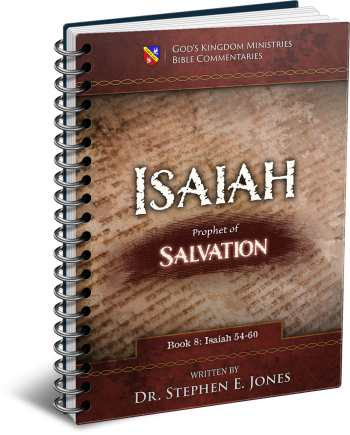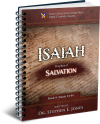Latest Posts
View the latest posts in an easy-to-read list format, with filtering options.

Isaiah is the prophet of Salvation. He is also known as the truly "Universalist" prophet, by which is meant that He makes it clear that salvation is extended equally to all nations and not just to Israel. He lived to see the fall of Israel and the deportation of the Israelites to Assyria, and he prophesied of their "return" to God (through repentance). He is truly a "major prophet" whose prophecies greatly influenced the Apostle Paul in the New Testament.
Category - Bible Commentaries

Isaiah tells us that because the watchmen are blind and the shepherds have no understanding, the wicked rule and the righteous suffer. Isaiah 57:1, 2 says,
1 The righteous man perishes, and no man takes it to heart; and devout men are taken away, while no one understands. For the righteous man is taken away from evil, 2 he enters into peace; they rest in their beds, each one who walked in his upright way.
Righteous government depends upon righteous teaching. When the religious leaders have no understanding of the law and nature of God, righteousness is punished, and wickedness is encouraged. In fact, it was often the temple priests who persecuted the prophets, claiming they were false prophets. The prime example of this, of course, is when they crucified Jesus and persecuted the Church. In John 15:20 Jesus said,
20 “Remember the word that I said to you, ‘A slave is not greater than his master.’ If they persecuted Me, they will also persecute you; if they kept My word, they will keep yours also.”
They persecuted the prophets for advocating a righteous standard of law. Their own standard, based on traditions of men, legalized sin, and they resented it when the prophets called their actions and attitudes sin. We see the same thing happening today, where it is unlawful to claim that certain violations of God’s law are sinful. Truth is now classed as “hate speech” and a violation of men’s right to sin.
So the prophet, using metaphorical language, tells us that the righteous are killed or executed. The righteous man “enters into peace” and they “rest in their beds.” The Hebrew word for “bed” is mishkab, a word used also to describe a tomb or bier, as in 2 Chron. 16:13, 14,
13 So Asa slept with his fathers, having died in the forty-first year of his reign. 14 They buried him in his own tomb which he had cut out for himself in the city of David, and they laid him in the resting place [mishkab] which he had filled with spices of various kinds…
Death was said to be “sleep,” and the tomb was said to be his “resting place.” So we read in 1 Kings 2:10,
10 Then David slept with his fathers and was buried in the city of David.
The prophet thus spoke of the righteous as entering into peace and resting in their beds/tombs. Some were violently killed, but many were taken out of their midst by God Himself. So we read in Heb. 11:37, 38,
37 They were stoned, they were sawn in two, they were tempted, they were put to death with the sword; they went about in sheepskins, in goatskins, being destitute, afflicted, ill-treated 38 (men of whom the world was not worthy), wandering in deserts and mountains and caves and holes in the ground.
According to oral history, Isaiah himself was “sawn in two” by King Manasseh prior to his conversion. The author of Hebrews confirms this, commenting that the world was not worthy of them. God gave them a righteous witness, but their witness was rejected. At some point God then removes the witness from their midst, because they are “not worthy.” The implication is that God allows these prophets and overcomers to be killed, so that they may enter into peace and rest in their tombs.
Isaiah 57:3-5 says,
3 “But come here, you sons of a sorceress, offspring of an adulterer and a prostitute. 4 Against whom do you jest? Against whom do you open wide your mouth and stick out your tongue? Are you not children of rebellion [pesha, “transgression”], offspring [zera, “seed”] of deceit, 5 who inflame yourselves among the oaks, under every luxuriant tree, who slaughter the children in the ravines, under the clefts of the crags?”
Such unflattering language was illustrated by the prophet Hosea, who was told to marry a prostitute named Gomer (Hosea 1:2, 3). In doing so, he entered into God’s own experience, when He married Israel at Mount Sinai. God’s wife became an adulterer and ran off with other lovers as a common prostitute.
The national condition in Isaiah’s day was no different. It was common for the people to make fun of the prophets. Few would have come to their defense, as this would have subjected them to the same derision. The tactic is all too common even today among the late-night television jesters who use comedy to ridicule the righteous.
To be a son is more than a genealogical offspring of one’s father. In Hebrew thought, a son was one who followed the example of another. Hence, there are children of wisdom, children of light, and sons of thunder. To be a son of Abraham, as Paul used the term, is to follow his example of faith.
So Isaiah calls the people of his generation children of transgression, because they served the law of sin, or transgression. They were also “offspring of deceit,” or children begotten by lies.
The prophet implies that they were conceived in the Asherah, “the groves,” where the ungodly Baal worshipers went to purify themselves before marriage. The common practice of the day was for men and women to go to the groves and have sexual relations with a priest or priestess in order to purify themselves for marriage. Often, the women would become pregnant by the priest, and she would then sacrifice her firstborn son to Baal. All of this was done because people believed the lie that God required them to sacrifice their firstborn.
The prophet implies that the people themselves were the children of lies, as if they had escaped somehow being sacrificed. They were children borne by deceit and lies, tracing back to the Garden of Eden itself and the original sin. The serpent deceived Eve and everyone else thereafter. Paul said in 2 Cor. 11:3, 4,
3 But I am afraid that, as the serpent deceived Eve by his craftiness, your minds will be led astray from the simplicity and purity of devotion to Christ. 4 For if one comes and preaches another Jesus whom we have not preached, or you receive a different spirit which you have not received, or a different gospel which you have not accepted, you bear this beautifully.
The serpent deceived Eve and all others by preaching another Jesus or by preaching “a different gospel” than what the apostles taught. Eve did not receive physical seed from the serpent, as some teach, but rather “a different spirit.”
Paul interpreted the original sin in the same way that Isaiah did. Isaiah did not accuse the Israelites of being physical offspring of the serpent or transgression or deceit. Neither did Paul accuse the Corinthians, who had been led astray by false teaching, of having sexual relations with a serpent.
Isaiah 57:6 says,
6 “Among the smooth stones of the ravine is your portion, they are your lot; even to them you have poured out a drink offering; you have made a grain offering. Shall I relent concerning these things?”
A man’s “portion” or “lot” is given by the god that men worship. The men in Isaiah’s day worshiped in “the ravine,” probably a reference to the valley of Ben-hinnom just outside of Jerusalem. This was the place where Jeremiah condemned the city and its people by smashing the earthen jar (Jer. 19:2, 10, 11).
The portion of that place of worship was death, as men sacrificed their children. So also, God condemned Jerusalem and its people to utter destruction, “as one breaks a potter’s vessel which cannot again be repaired.” The judgment thus fit the crime.
God asks the prophet, “Shall I relent concerning these things?” The question was unanswered until another century had passed, when Jeremiah gave the answer in Jer. 19:10, 11.
Isaiah 57:7, 8 continues,
7 Upon a high and lofty mountain you have made your bed; you also went up there to offer sacrifice. 8 Behind the door and the doorpost you have set up your sign; indeed, far removed from Me, you have uncovered yourself, and have gone up and made your bed wide. And you have made an agreement for yourself with them, you have loved their bed, you have looked on their manhood [yad].”
Notice the contrast between the “bed” of the righteous in verse 1 and the “bed” of the wicked in verse 7. The wicked had gone to the high places of Baal to worship false gods and had committed fornication with the priests and priestesses there. Because they had made their bed there, they had ensured that they would be destroyed as well. In other words, they had “made their bed” in Sheol. Their judgment fit the crime.
The prophet describes their religious practices in terms of what they were doing behind closed doors. They set up their sign: “Occupied” or “Keep Out.” It was as if they had posted a sign for God to keep out while they “uncovered” themselves. It pictured a place of prostitution, where the people “loved their bed” and “looked on their manhood.”
The Hebrew word translated “manhood” is yad, which literally means “hand.” The word carries much more than a literal meaning, as the NASB indicates. A hand signifies strength, and strength itself was also the euphemism for one’s ability to beget children. So Jacob testified that his firstborn son, Reuben, was “the beginning of my strength” (Genesis 49:3).
Paul himself used this in a spiritual sense when speaking of Abraham in Rom. 4:19, 20,
19 Without becoming weak in faith he contemplated his own body, now as good as dead since he was about a hundred years old, and the deadness of Sarah’s womb; 20 yet, with respect to the promise of God, he did not waver in unbelief but grew strong in faith, giving glory to God.
To have physical strength was to be virulent, not impotent, and to be “strong in faith” was to be able to beget spiritual children.
Isaiah’s term yad, used in the context of a house of prostitution, means “manhood.” He was referring to the exposure of one’s nakedness in the wide bed provided in that place. By understanding the difference between the natural and the spiritual, we can say that men make their own beds, so to speak, by following the religion of Baal. Being sons of transgression, they may produce children in their own likeness, but the sons of God are begotten in a lawful manner by the Spirit and come into the likeness of Christ.
These true sons of God are the righteous, who die in "peace" and "rest in their beds" (Isaiah 57:2).